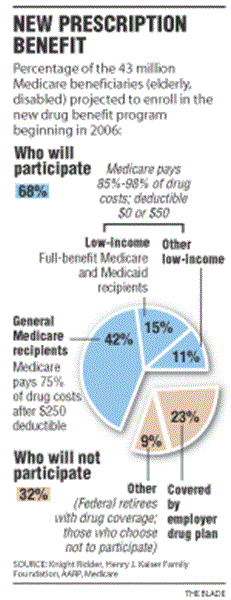
Drug plan pitches can start today; insurers are likely to bombard senior citizens with multiple choices
10/1/2005
If you're 65 or older and on Medicare, starting today you might need a bigger mailbox - and a bottle of aspirin.
The bigger mailbox is for the expected deluge of marketing material from insurance firms who can now pitch competing Medicare prescription-drug plans aimed at providing cheaper drugs for senior citizens.
The aspirin is for the headaches you might suffer trying to sort out all the competing offers.
"I'm spending quite a bit of time getting my own staff trained to [answer questions] and if it's taking this much time to get our nurses and social workers trained, you can imagine how confusing it will be for the average retiree," said Billie Johnson, executive director of the Area Office on Aging of Northwest Ohio.
Don't believe her? Just listen to one of the companies sending out some of that material.
"If you like the tax code, you'll love this," said Mark Moser, spokesman for Toledo-based Paramount Health Care, also operating as Paramount Insurance Co. "We've already talked to a few seniors as a test, and there's a lot of confusion."

If this is a good-news, bad-news scenario, keep the good news in mind, Ms. Johnson said. The bad news is there's a lot of confusing information to sort through. But she said most seniors should save money when buying prescription drugs - once they figure out which plan to pick.
"It's a lot of information, but we'll get through it," she said. "I'm optimistic that they'll see some savings."
The Medicare prescription-drug plans are aimed at providing the 42 million Americans on Medicare with cheaper access to prescription drugs. Marketing companies can begin sending out promotional materials today. Enrollment starts Nov. 15, with coverage beginning Jan. 1.
The drug benefit plan was passed in 2003 after much criticism from those worried about its costs. The federal government is expected to spend at least $720 billion over the next 10 years to fund it.
The Medicare prescription-drug plan - also known as Medicare Part D - works something like this: Each person enrolled pays a $250 annual deductible. Medicare will then cover 75 percent of drug expenses up to $2,250. The coverage stops after that until the enrollee has spent an additional $2,850 of their own money. After that, Medicare will pay the remaining 95 percent of all additional drug costs.
Where much of the confusion is expected will be from all the competing offers from various insurance companies touting their version of a Medicare prescription-drug plan. The government is offering the drug plan through private insurers under the theory that competition will hold down costs. As a result, seniors should expect mailings, TV commercials, radio advertisements, and other promotional material over the next several months.
Ten large national health insurance companies have government approval to sell Medicare discount plans, and other smaller regional companies, such as Paramount, will offer government-approved coverage too. Ohio Department of Insurance officials say 17 insurance companies have been authorized to offer "stand-alone" Medicare prescription-drug plans in Ohio, meaning they will operate like a basic fee-for-service insurance plan. In addition, 14 companies will offer plans through Medicare "advantage" plans, which are insurance plans that operate like an HMO or PPO.
Seniors should examine and compare all the competing plans because they could potentially save more money depending on the plan they choose. For example, some plans will waive the annual deductible cost or offer cheaper co-pays on drugs.
Ann Womer Benjamin, director of the Ohio Department of Insurance, urged seniors to ask her department for advice in sorting out offers. Her agency has been busy training staff to field the large volume of calls expected, and she said staff members have access to a computer program that can help them tell seniors which drug plan is the best for them. Those with questions should call 1-800-686-1578.
The insurance department's Web site also has information available at www.ohioinsurance.gov. Michigan residents can try www.mymmap.org or call 1-800-803-7174.
Ms. Johnson said the Area Office on Aging is also available to assist seniors by calling 419-382-0624. Her office is planning several educational events: Oct. 12 from 1 to 3 p.m. at the Dana Center on the campus of the Medical University of Ohio in Toledo; Oct. 25 from 1 to 3 p.m. at the UAW hall, 2120 Baltimore St., Defiance; and Oct. 28 from 1 to 3 p.m. at the IAB Club, 1617 Milan Rd., Sandusky.
Contact Luke Shockman at: lshockman@theblade.com
or 419-724-6084.